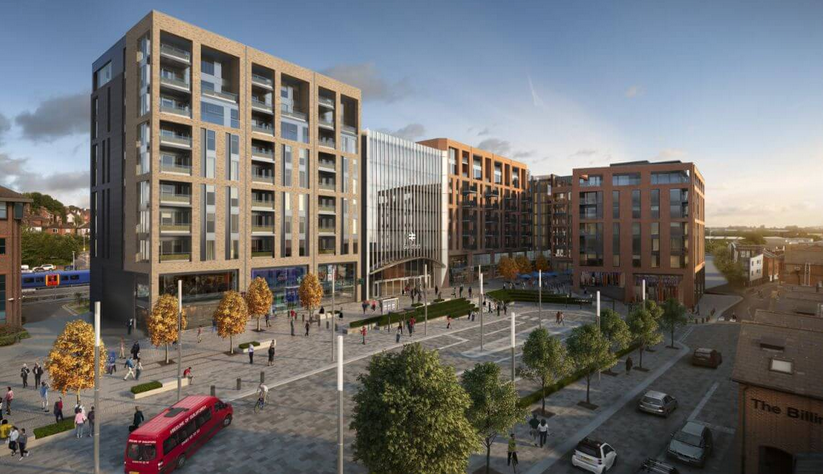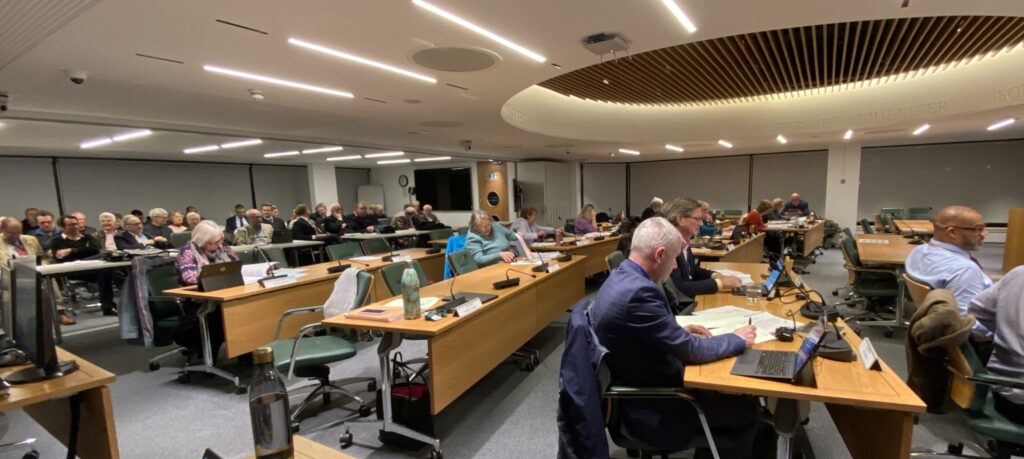 Abraham Lincoln
If given the truth, the people can be depended upon to meet any national crisis...
Abraham Lincoln
If given the truth, the people can be depended upon to meet any national crisis...
 Guildford news...
for Guildford people, brought to you by Guildford reporters - Guildford's own news service
Guildford news...
for Guildford people, brought to you by Guildford reporters - Guildford's own news service
Opinion: Why Planning at Guildford Borough Council is Not Working
Published on: 1 May, 2023
Updated on: 4 May, 2023
Planning has been an increasingly vexed subject at GBC as the pressure from central government for more and more development is applied.
Here, Bernard Quoroll, an experienced local government officer who has served as chief executive or senior officer in six local authorities, gives his informed view of the subject…
By Bernard Quoroll
The furore over Debenhams and the North Street “towers”, tells us a lot about how well GBC has worked or not worked over the years.
The odds against getting the kind of development that Guildford needs, have of course been heavily stacked for decades by a town planning system designed to meet the needs of developers and the aspirations of central government, rather than those of local people – if you want further evidence of that, just look at the Solum development at the railway station.
See: Solum Starts Station Phase for 98 New Homes and 640-space Car Park
Local people are often more aware of what they don’t like rather than appreciating the many trade-offs necessary to achieve acceptable development, which is often the art of the possible. But we should not be surprised about that. It is not their job to map out the future of our town.
It is however the council’s job. And councils are not completely without weapons in what seems like an endless attritional battle.
The starting point is to have a common vision for the town.
Vision Statements are never what they seem. they are not blueprints. They quickly get overtaken by the passage of time and events and they are rarely implemented in precise conformity with a Master Plan. But they do enable important “musts and must nots” to be identified.
They allow the vernacular of a town worth preserving or enhancing to be identified and catalogued and they give early notice to developers (who like certainty) of the kinds of development which will get an easier passage. Most of all they provide a consensus around something to get excited about – what the future could be like!

Cathedral Square in Freiburg im Breisgau, Baden-Württemberg. Guildford’s twin town was sympathetically restored after extensive bomb damage in the Second Worl War.
Go to many comparable European towns and you will find someone ready to point out the rich features of the place where they live, which may have been developed over centuries and be given an idea of what comes next. If you are lucky you will sense the pride of place and sense of continuity which I have experienced. I am not sure you would find that to the same extent in Guildford.
Every significant new planning application represents a challenge to local aspiration. The playbook is designed to help developers achieve objectives which may or may not meet local needs. For big developments, that invariably includes a first scheme iteration which may be denser or higher than local expectations. That enables developers to claim that the second iteration which is marginally reduced, responds to the results of their own consultation process.
Second, the developer gets to cost its own scheme design so that when the cost of community benefits gets factored in, the developer has the upper hand when negotiating what is “affordable”. A council typically employs its own experts to challenge a developer’s case but they are invariably on the back foot.
Nor are they around when the developer moves on to reduce the costs of development to its own advantage as the scheme progresses. There are mechanisms but it is a game of cat and mouse in which the developer is too often the cat!
Then there is the issue of design. Refusal on design grounds is notoriously difficult. It is hard to resist “more of the same” because beauty is in the eye of the beholder” (or, more pointedly, the applicant’s architect and client) and appeal inspectors are given no help in determining whether a design proposal is an asset to a town as opposed to being good enough.
By the time an application gets to a planning committee the die has largely been cast. Elected people are confronted by a lengthy technical report with potentially dozens of appendices, which suggest that an application is not refusable.
the system… is a recipe for mediocrity”
Objections are rarely given adequate air time by professional officers intent on justifying their opinions and ready to point out the risks of costs on a lost appeal. Suddenly time seems to have run out. Applications with huge implications are processed just like small ones.
Some councils are better than others at anticipating controversial applications and negotiating proactively with a clear sense of what councillors are likely to be concerned about and an awareness of what motivates developers. Some find ways of giving advance notice to developers that there are important red lines not to be crossed.
See also: A Good Walk Spoiled – The Gulf Between Proficient Planning and What We Have
But the system is increasingly designed to be reactive rather than proactive so it is no easy task in a system designed to require permissions to be granted unless there are acknowledged reasons for refusal. It is a recipe for mediocrity.
An important consideration is the ambition and continuity of approach of a planning department whose best work can sometimes be done around the margins of an application, which in turn needs space and time.
Guildford’s problems in recruiting staff with the right levels of experience and of retaining them are well known. It drives departments to focus on catching up with backlogs at the expense of quality.
Planners want to save councillors from themselves and councillors fret about who is in charge. Not a recipe for good planning.”
The process in committee may become adversarial with anxieties being shown in both sides. Mutual respect can be overtaken by a kind of passive aggression. I have seen it many times. Councils which behave in that way can become dysfunctional. Under stress, constructive tension becomes a battle of wills.
Planners want to save councillors from themselves and councillors fret about who is in charge. Not a recipe for good planning. There are signs of that in Guildford.
And then there are the council’s own assets. Most councils own significant assets in their towns and have powers of compulsory purchase which enable them to assemble sites and unlock ransom ownerships.
 Proactive councils can work powerfully with the private sector to promote the right kind of development in their towns. (They often know more about local development opportunities than developers).
Proactive councils can work powerfully with the private sector to promote the right kind of development in their towns. (They often know more about local development opportunities than developers).
Councils sometimes, as in North Street, wear two hats. One as an owner of land and one as a planning authority. They have a duty of impartiality requiring what is now called an “ethical wall” to be maintained between planning and property departments and their respective committees. (That is one of the reasons why governments retain a power of “call in” when there is a perceived conflict of interests, although applications are also called in for political reasons).
But none of this prevents a council from using its own assets as leverage in a negotiation with a prospective developer. Such situations can be tricky to handle but less so for councils which have the right skills and protocols and most importantly, know what they are trying to achieve on behalf of their communities.
I am not going to engage in a debate about which political party or group did or did not call out the issue of building height in respect of North Street. I think it misses the point. Guildford’s planning problems are more subtle and go back much further in time. There will be more North Streets.
A good start would be to work harder at finding out what their citizens think.”
There are other issues to consider. GBC has never achieved a meaningful partnership with Surrey County Council as the highway authority which is a key player in the planning process but preoccupied with meeting the needs of other communities. Nor can any one elected member provide the knowledge and continuity needed to secure the future of the town. It is a task requiring insights and inputs from other councillors and officers.
All councils have to manage these issues and in that respect, Guildford is not unusual. There is no magic wand but some solutions can be found in the extent to which political parties look for consensus on locally important issues; in the clarity of direction they collectively give to officers (as local government employees are called); in the extent to which they understand the need to use all the resources of the council to achieve clearly stated objectives rather than looking at planning as an isolated function.
It is also a leadership issue for political parties collectively and for the way in which, internally, teams are formed and managed over time. Master plans help but the devil is in the detail. Councils can be forgiven when they are occasionally defeated by the odds but serial defeat requires a response.
A good start would be to work harder at finding out what their citizens think.
Recent Articles
- Guildford Institute’s Crowdfunding Project for Accessible Toilet in its New Community and Wellbeing Centre
- Letter: Guildford – Another Opportunity Missed?
- Letter: GBC’s Corporate Strategy – Where Is the Ambition?
- My Memories of John Mayall at a Ground-breaking Gig in Guildford Nearly Six Decades Ago
- Westborough HMO Plans ‘Losing the Heart of the Street’ Says Resident
- College Invests to Boost Surrey’s Economy and Close Digital Skills Gap
- Community Lottery Brings Big Wins for Local Charities
- GBC Housing Plan Promises ‘A Vibrant Urban Neighbourhood’ Near Town Centre
- Hospital Pillows ‘Shortage’ at the Royal Surrey
- Updated: Caravans Set Up Camp at Ash Manor School


Search in Site
Media Gallery
Dragon Interview: Local Artist Leaves Her Mark At One of England’s Most Historic Buildings
January 21, 2023 / No Comment / Read MoreDragon Interview: Lib Dem Planning Chair: ‘Current Policy Doesn’t Work for Local People’
January 19, 2023 / No Comment / Read MoreA3 Tunnel in Guildford ‘Necessary’ for New Homes, Says Guildford’s MP
January 10, 2023 / No Comment / Read More‘Madness’ for London Road Scheme to Go Ahead Against ‘Huge Opposition’, Says SCC Leader
January 6, 2023 / No Comment / Read MoreCouncillor’s Son Starts Campaign for More Consultation on North Street Plan
December 30, 2022 / No Comment / Read MoreCounty Council Climbs Down Over London Road Works – Further ‘Engagement’ Period Announced
December 14, 2022 / No Comment / Read MoreDragon Interview: GBC Reaction to the Government’s Expected Decision to Relax Housing Targets
December 7, 2022 / No Comment / Read MoreHow Can Our Town Centre Businesses Recover? Watch the Shop Front Debate
May 18, 2020 / No Comment / Read More













Recent Comments